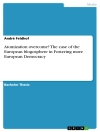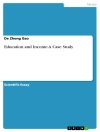A groundbreaking book that explores the theory and practice of leading in the creative workplace
Leadership in the Creative Industries is a much-needed guide to the theory and practice of the creative leadership skills that are essential to lead effectively in creative fields. As the growth of creative industries continues to surge and “noncreative” businesses put increasing emphasis on creativity and innovation, this book offers a practical resource that explores how to confidently lead a workforce, creatively.
In order to lead creative people it is essential to understand the creative process, creativity, and the range of variables that affect it. This book fills a gap in the literature by exploring the creative leadership practices that are solidly grounded in evidenced-based research. The author includes suggestions for overcoming the challenges associated with leading creative people, and puts to rest many of the current industry misconceptions about leading creatively. This vital resource:
- Is the first book that highlights the theory and practice of creative leadership skills in the creative industries
- Includes best practices of leading for creativity, and reveals what encourages creativity and what suppresses it
- Debunks commonly held myths about leading a creative workforce with evidence-based guidance
- Contains a wealth of helpful tips, visualizations, callouts from primary research, and anecdotes from recognized thought leaders, to highlight and underscore important principles.
Written for academics and students of leadership, those working or aspiring to work in the creative industries, Leadership in the Creative Industries puts the focuses directly on theory and practice of creative leadership in creative fields.
Tabella dei contenuti
Acknowledgments xiii
Introduction 1
Section I Creativity and Creative People: What You Need to Know About How They Work 5
1 Creativity and the Creative Industries 7
1.1 What Is Creativity? 9
1.2 What Are “the” Creative Industries – And Why Are We Using This Term? 10
1.3 Leading Creatives Makes Rocket Science Look Easy 13
1.4 Fundamentals of Creative Theory 14
1.5 The Creative Challenge. Actually, Several of Them 18
1.6 Chapter Summary 23
1.7 Ideas + Action 23
1.8 Some Great Reads + Resources 23
References 23
2 The Role of the Leader in Creative Work 27
2.1 What You Are, and What You Do: Personal Characteristics and Creative Leadership 28
2.2 Chapter Summary 43
2.3 Ideas + Action 46
2.4 Some Great Reads + Resources 46
References 46
3 Understanding and Managing for Creativity 49
3.1 The Science, and Art, of Creativity 50
3.2 Creative Personality, Traits, and Behaviors 55
3.3 How the Process Impacts the Creative Product, and Where the Leader Fits In 60
3.4 From Traits to Situational Influences – Where Leaders Fit in the Creative Process 62
3.5 External Influences: The Domain, the Field. Social, and Organizational 66
3.6 Chapter Summary 67
3.7 Ideas + Action 67
3.8 Some Great Reads + Resources 68
References 68
4 The Creative Community: One, Big, Sometimes Dysfunctional, Family 71
4.1 Creative Leadership Is Not Just an Inside Job 72
4.2 Approach Professional Networks Strategically 78
4.3 Why Are Networks Critical to Leadership? 79
4.4 You Build Expertise Through Your Networks, and Demonstrate It 80
4.5 Community Is Currency Is the “Gig” Economy 85
4.6 Community Has Some Painful Side‐Effects, Too 87
4.7 Chapter Summary 89
References 89
Section II From Creative Staffer to Creative Leader 93
5 The Factors That Make or Break a Creative Leader 95
5.1 Who You Fundamentally Are Affects the Leader You Will Be 96
5.2 To Lead, You Need to Think Like a Leader and Act Like a Leader 98
5.3 Act Like a Leader: Essential Behaviors to Lead for Creativity 104
5.4 Chapter Summary 114
5.5 Ideas + Action 116
5.6 Some Great Reads + Resources 116
References 116
6 Creative Work Never Ends: Neither Does Creative Leadership 119
6.1 Leadership Is a Marathon, Not a Sprint 120
6.2 Learn, Think, Do. And Don’t. The Habits of Great Leaders 120
6.3 Question Everything. Regularly. Rinse and Repeat 122
6.4 The Mentorship Mandate 125
6.5 Remember: It’s Not Business, It’s Personal 128
6.6 Talent: Finding, Encouraging, and Keeping the Best People 129
6.7 Chapter Summary 136
6.8 Some Great Reads + Resources 137
References 137
Section III Leading For Creativity and Better Creative Work 141
7 Leadership and the Environment for Creativity 143
7.1 Context Is Created Before Anything Else Is 144
7.2 How the Leader Builds Culture and Climate: Inspiration, Motivation, Implementation 147
7.3 Culture Building Basics: Start with a Philosophy 149
7.4 Let’s Get Physical 158
7.5 External Influences on Culture and Climate 159
7.6 Chapter Summary 160
7.7 Ideas + Action 160
7.8 Some Great Reads + Resources 161
References 161
8 Collaboration, Teams, and Creativity 163
8.1 Where Leaders, Teams, and Teamwork Intersect 165
8.2 Building Great Creative Teams 171
8.3 Chapter Summary 179
8.4 Some Great Reads and Resources 179
References 180
9 Motivation, Competition, and Conflict 185
9.1 Motivation Through Shared Leadership and Autonomy 186
9.2 Other Motivators 187
9.3 Tried and True Ways to De‐motivate Creative Teams (Use with Caution) 189
9.4 Making Collaboration Magic 191
9.5 Creative Industries Are Rife with Possibilities for Conflict 193
9.6 A Little Healthy Competition? 195
9.7 When Competition Turns into Conflict 197
9.8 Chapter Summary 199
References 200
10 Diversity and Creativity: It’s Everybody’s Problem. And It’s Big 203
10.1 Trade Popular Fiction for Cold, Hard Facts 204
10.2 Reality Check: Some Painful Truths, and (Real) Numbers 206
10.3 Why Has So Little Changed in So Long? 207
10.4 Why the Creative Industries Need Diversity More Than Individuals Do 212
10.5 What You Can Do to Foster Diversity 214
10.6 Chapter Summary 218
10.7 Some Great Reads + Resources 218
References 219
Section IV The Future Is What You Make It 227
11 A Look at Ethics and the Big Picture 229
11.1 Ethics Can No Longer Be the Last Thing on the Mind of Creative Leaders 230
11.2 What Is Valued, by Whom? 231
11.3 Disagreement Is Good for Creativity – and Ethical Decisions 234
11.4 Chapter Summary 241
References 242
12 Now What? 247
12.1 How to Build an Enduring Creative Career 247
12.2 Create Your Story: Actively Shape Your Professional Reputation 249
12.3 Are You Ready for Leadership? 254
12.4 From Seeing the Future to Being the Future 256
12.5 Chapter Summary 260
12.6 Ideas + Action 262
12.7 Some Great Reads and Resources 262
References 263
Appendix 265
Index 273
Circa l’autore
Karen L. Mallia is professor at the University of South Carolina School of Journalism and Mass Communications, where she has been awarded for outstanding teaching, research and professional service. She is a creativity and marketing communication expert with more than 20 years as an award-winning copywriter and creative director, and consultant in creative strategy in advertising, and more than a decade as an advertising professor.












